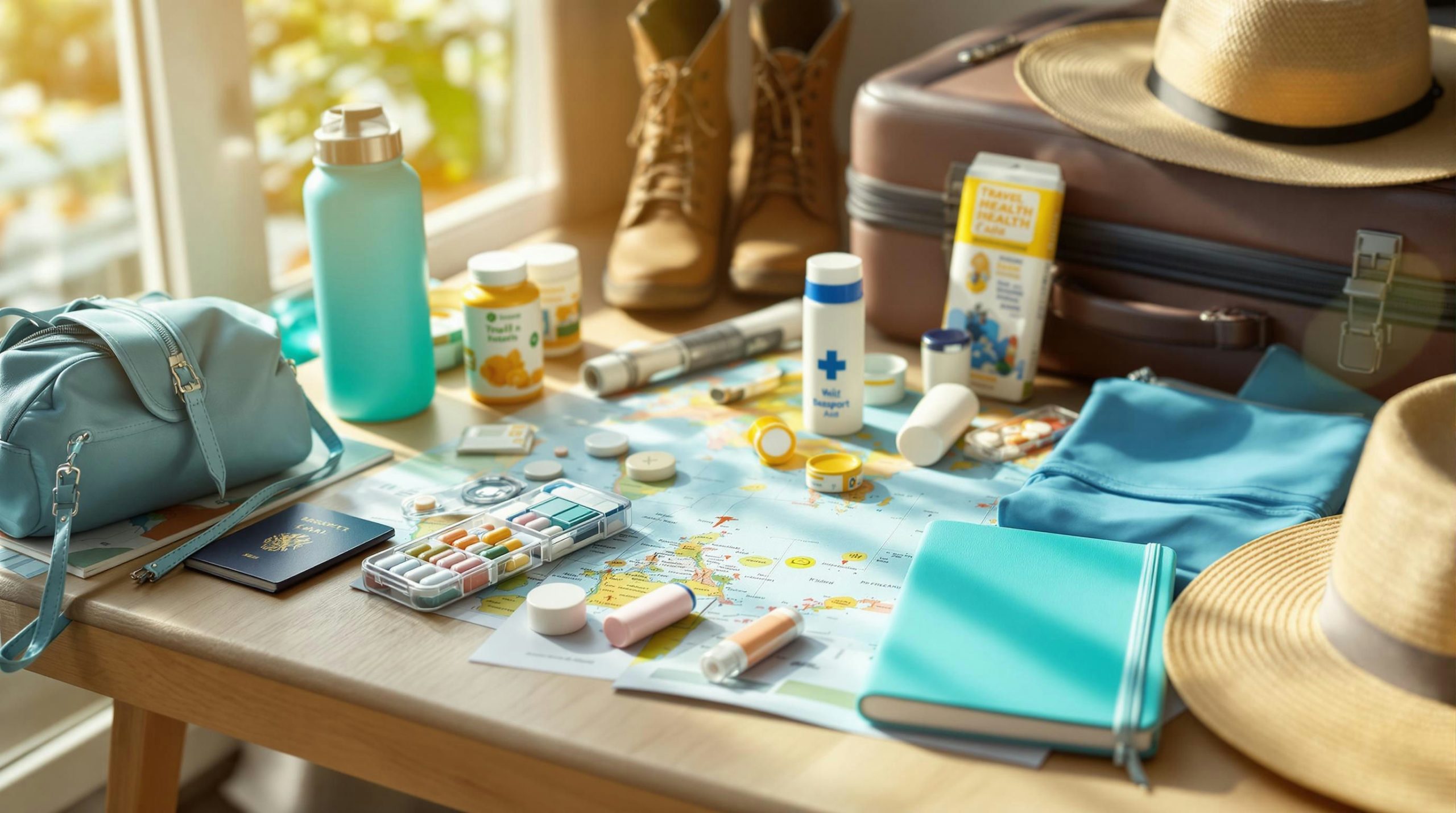Traveler’s Health Checklist: Essential Tips for Safe and Healthy Trips
Traveler’s Health Checklist: Essential Tips for Safe and Healthy Trips
There’s something uniquely exhilarating about traveling—exploring new landscapes, experiencing different cultures, and creating lasting memories. Yet, amid the excitement of planning itineraries and booking accommodations, health considerations often take a back seat. At Care& Family Health, we see many travelers who encounter preventable health issues that could have been addressed with proper preparation.
Whether you’re planning an international adventure, a cross-country business trip, or a local weekend getaway, your health deserves thoughtful consideration. The truth is that travel introduces unique health risks—from exposure to unfamiliar pathogens to disruption of medication schedules and the physical demands of changing environments.
This comprehensive guide provides actionable advice for managing health risks before, during, and after travel. By taking proactive steps, you can significantly reduce the likelihood of health concerns interfering with your journey and enjoy peace of mind wherever your travels take you.
Pre-Travel Health Planning: 4-8 Weeks Before Departure
Schedule a Pre-Travel Health Assessment
One of the most valuable steps for any traveler is consulting with a healthcare provider well before your departure date. Ideally, this should happen 4-8 weeks before international travel to allow time for vaccinations and medication adjustments.
During a pre-travel health assessment, a Nurse Practitioner or other healthcare provider can:
- Review your destination-specific health risks
- Ensure your routine vaccinations are up-to-date
- Recommend travel-specific vaccines or medications
- Discuss management strategies for existing health conditions
- Provide personalized advice based on your health history
For travelers with chronic conditions like diabetes, hypertension, or asthma, this appointment is particularly important to develop strategies for managing your condition abroad and handling potential complications.
Research Destination-Specific Health Risks
Every destination presents unique health considerations. Before traveling, research:
- Required and recommended vaccinations
- Common illnesses in your destination (seasonal flu, malaria, dengue, etc.)
- Food and water safety concerns
- Air quality issues
- Altitude considerations
- Access to healthcare services
- Extreme weather conditions that might affect health
Reliable resources include:
- Government of Canada’s Travel Health Notices
- World Health Organization (WHO) travel advisories
- Centers for Disease Control and Prevention (CDC) Travelers’ Health website
- International Association for Medical Assistance to Travelers (IAMAT)
Vaccination Planning
Depending on your destination, certain vaccinations may be required for entry, while others are strongly recommended to protect your health. Common travel vaccines include:
- Hepatitis A and B
- Typhoid
- Yellow fever (required for entry to certain countries)
- Japanese encephalitis
- Rabies
- Meningococcal meningitis
- COVID-19 (including any recommended boosters)
Remember that some vaccines require multiple doses spaced weeks apart, which is why early planning is essential. Additionally, some vaccines should be administered at least 10-14 days before travel to develop full immunity.
Obtain and Organize Medications
If you take prescription medications, prepare carefully:
- Refill prescriptions to ensure you have more than enough for your entire trip (plus extra in case of delays)
- Keep medications in original, labeled containers
- Pack a copy of your prescriptions using generic drug names (brand names may differ internationally)
- Research medication restrictions at your destination—some common North American medications are restricted or illegal in certain countries
- Confirm how to store your medications if traveling to extreme climates
Don’t forget to pack appropriate over-the-counter medications as well:
- Pain relievers/fever reducers
- Antidiarrheal medication
- Motion sickness remedies
- Antihistamines for allergic reactions
- Hydrocortisone cream for insect bites or rashes
- Antacids for digestive issues
Prepare a Personalized Medical Information Card
Create a wallet-sized card containing:
- Your full name and emergency contact information
- Blood type
- Chronic medical conditions
- Current medications and dosages
- Significant allergies
- Healthcare provider contact information
- Travel insurance details
For international travel, consider having this information translated into the language of your destination.
Secure Appropriate Travel Health Insurance
Canadian provincial health plans offer limited coverage outside your home province and minimal to no coverage internationally. Appropriate travel health insurance is essential to avoid potentially catastrophic expenses.
Look for policies that include:
- Emergency medical treatment
- Hospital stays
- Medical evacuation (which can cost $50,000-$100,000 from remote locations)
- Pre-existing condition coverage (if applicable)
- Repatriation coverage (transport back to Canada if necessary)
- 24/7 emergency assistance services
When comparing policies, pay careful attention to coverage limits, deductibles, exclusions (especially regarding pre-existing conditions), and the claims process.
Travel Health Kit Essentials
Basic First Aid Items
Pack a compact but comprehensive first aid kit containing:
- Adhesive bandages in various sizes
- Gauze pads and adhesive tape
- Antiseptic wipes or solution
- Tweezers and small scissors
- Elastic bandage for sprains
- Digital thermometer
- Disposable gloves
- Blister treatment supplies
Medication Supplies
Beyond your personal prescriptions, consider including:
- Oral rehydration solutions for treating dehydration
- Broad-spectrum antibiotic (if prescribed by your healthcare provider)
- Antimalarial medication (if traveling to affected areas)
- Altitude sickness medication (if applicable)
- Antibiotic ointment for minor cuts and abrasions
Preventive Health Items
Don’t forget these important preventive health supplies:
- Insect repellent (containing DEET, picaridin, or oil of lemon eucalyptus)
- Sunscreen (minimum SPF 30)
- Hand sanitizer (at least 60% alcohol)
- Disinfectant wipes for surfaces
- Water purification tablets or portable filter (for remote travel)
- N95 or KN95 masks
- Condoms or other barrier methods for safer sex
Specialized Items Based on Destination and Activities
Depending on your specific plans, consider adding:
- Altitude sickness medications (for high elevation destinations)
- Motion sickness remedies (for boat trips or winding roads)
- Epinephrine auto-injector (if you have severe allergies)
- Glucose monitoring supplies and insulin (for diabetes)
- Specialized gear for adventure activities (like first aid supplies for hiking)
During Travel: Staying Healthy En Route
Managing Jet Lag
Crossing multiple time zones can disrupt your circadian rhythm, leading to fatigue, insomnia, digestive issues, and reduced immune function. To minimize jet lag:
- Gradually adjust your sleep schedule before departure
- Stay hydrated before and during flights (limit alcohol and caffeine)
- Move around during long flights to maintain circulation
- Consider melatonin supplements (discuss with your healthcare provider first)
- Spend time outdoors at your destination to help reset your body clock
- Adapt to the local time immediately upon arrival
Preventing Deep Vein Thrombosis (DVT)
Long periods of immobility during travel increase the risk of blood clots, especially in flights lasting more than 4 hours. Reduce your risk by:
- Performing simple leg exercises hourly (ankle circles, calf raises)
- Standing and stretching at least every 2 hours
- Staying well-hydrated
- Wearing compression socks (particularly beneficial for those with higher risk)
- Avoiding sleeping pills that might reduce movement
- Moving around the cabin when safe to do so
Respiratory Health During Travel
The confined spaces of airplanes, trains, and buses can increase exposure to respiratory illnesses. Protect yourself by:
- Wearing a high-quality mask in crowded transportation settings
- Using nasal saline spray to maintain mucous membrane moisture
- Avoiding touching your face
- Practicing frequent hand hygiene
- Directing air vents away from your face on airplanes
- Considering immune-supporting supplements (after discussion with your healthcare provider)
Health Maintenance at Your Destination
Safe Food and Water Practices
Foodborne and waterborne illnesses are among the most common travel-related health problems. Protect yourself by following these guidelines:
- Drink only bottled, filtered, or properly treated water
- Avoid ice in beverages unless made from purified water
- Remember the traveler’s mantra: “Boil it, cook it, peel it, or forget it”
- Eat foods that are freshly cooked and served hot
- Avoid raw or undercooked meats, seafood, and eggs
- Be cautious with street food—choose vendors with high turnover and proper food handling
- Wash hands thoroughly before eating (or use hand sanitizer)
- Peel fruits and vegetables yourself using clean hands
- Be particularly cautious with dairy products in regions with limited refrigeration
Environmental Health Considerations
Different environments present unique health challenges:
Heat and Sun Exposure:
- Apply broad-spectrum sunscreen regularly
- Wear protective clothing, including wide-brimmed hats
- Seek shade during peak sun hours (10 AM to 4 PM)
- Drink plenty of fluids to prevent dehydration
- Learn to recognize heat exhaustion and heat stroke symptoms
Cold Weather Travel:
- Dress in layers to trap warm air
- Protect extremities with proper gloves, socks, and headwear
- Stay dry to prevent hypothermia
- Be aware of frostbite warning signs (numbness, white/grayish-yellow skin)
- Maintain hydration, despite reduced thirst signals in cold weather
High Altitude:
- Ascend gradually to allow acclimatization (increase elevation by no more than 300-500 meters per day above 3,000 meters)
- Stay hydrated and avoid alcohol
- Consider acetazolamide (Diamox) for prevention if recommended by your healthcare provider
- Recognize symptoms of altitude sickness: headache, nausea, fatigue, dizziness
- Descend immediately if experiencing severe symptoms
Insect-Borne Disease Prevention
Many serious travel-related illnesses are transmitted by insects, including malaria, dengue, Zika virus, and yellow fever. Effective prevention strategies include:
- Using appropriate insect repellent on exposed skin
- Wearing long sleeves and pants, especially during dawn and dusk
- Sleeping under insecticide-treated bed nets when necessary
- Using permethrin-treated clothing for high-risk areas
- Checking your body for ticks after outdoor activities
- Taking prescribed antimalarial medications exactly as directed
- Staying in accommodations with screens or air conditioning when possible
Managing Chronic Health Conditions While Traveling
For travelers with ongoing health needs:
- Maintain medication schedules across time zones (use medication timing apps if helpful)
- Adjust insulin dosing appropriately if you have diabetes
- Monitor chronic conditions more frequently during travel
- Know how to adjust medications for illness or digestive issues
- Carry medical alert identification
- Learn key phrases related to your condition in local languages
- Research healthcare facilities at your destination before arrival
- Consider connecting with local patient organizations for support
Responding to Health Issues While Traveling
When to Seek Medical Care Abroad
Know the warning signs that require prompt medical attention:
- Fever over 38°C (100.4°F), especially with rash or severe headache
- Persistent vomiting or diarrhea with inability to keep fluids down
- Signs of dehydration (extreme thirst, dry mouth, minimal urination)
- Respiratory issues including difficulty breathing
- Severe pain (head, chest, abdomen)
- Major injuries, including potential fractures
- Unusual bleeding or bruising
- Neurological symptoms (confusion, weakness, difficulty speaking)
Navigating Foreign Healthcare Systems
If you need medical attention while traveling:
- Contact your travel insurance provider before seeking non-emergency care
- Ask your accommodation for recommended healthcare facilities
- Use the International Association for Medical Assistance to Travelers (IAMAT) to find English-speaking doctors
- Bring a translator or use translation apps for important medical conversations
- Request written records of diagnoses, treatments, and prescriptions
- Keep all receipts and documentation for insurance claims
- For serious situations, contact the nearest Canadian embassy or consulate for assistance
Common Travel Ailments and Self-Care Strategies
Traveler’s Diarrhea:
- Focus on hydration with safe water or oral rehydration solutions
- Consider bismuth subsalicylate or loperamide for symptom relief (not for bloody diarrhea)
- Use prescribed antibiotics if symptoms are severe or persistent
- Gradually reintroduce solid foods, starting with bland, simple options
- Seek medical care if symptoms include high fever, severe abdominal pain, bloody stools, or dehydration
Respiratory Infections:
- Rest and maintain hydration
- Use over-the-counter medications for symptom relief
- Monitor for worsening symptoms, particularly shortness of breath
- Isolate from others when possible if symptoms suggest COVID-19 or other contagious illnesses
- Seek care if symptoms are severe or persistent
Motion Sickness:
- Choose seats with less motion (middle of airplane, front of car, middle of boat)
- Focus on a fixed point on the horizon
- Use over-the-counter or prescription motion sickness medications
- Try acupressure wristbands
- Avoid heavy meals and strong odors before and during travel
Post-Travel Health Considerations
When to Seek Post-Travel Medical Evaluation
Consider a medical assessment after returning home if you:
- Develop a fever within three months of returning
- Experience persistent digestive issues
- Have unusual skin problems, including rashes or sores
- Notice unexplained fatigue or weakness
- Traveled to areas with high rates of infectious diseases
- Had a known exposure to an infectious disease
- Were hospitalized abroad
- Participated in healthcare work internationally
Recovering from Travel-Related Stress and Fatigue
The physical and psychological impacts of travel can linger. Help your body recover by:
- Allowing adequate time to readjust to your home time zone
- Prioritizing sleep and maintaining a consistent schedule
- Staying hydrated and eating nutritious foods
- Incorporating gentle exercise to restore energy
- Practicing stress management techniques
- Giving yourself permission to ease back into routine gradually
Monitoring for Late-Developing Symptoms
Some travel-related illnesses have long incubation periods. For several months after returning:
- Be attentive to unusual health changes
- Inform healthcare providers about recent travel if you develop symptoms
- Complete any prescribed post-travel medication courses (like antimalarials)
- Follow up on recommended post-travel screening if you had potential exposures
Special Travel Health Considerations
Family Travel with Children
Traveling with children requires additional health planning:
- Consult with a pediatrician or Nurse Practitioner regarding child-specific travel health needs
- Ensure age-appropriate vaccinations are up-to-date
- Pack child-specific medications and first aid supplies
- Prepare for common travel issues like ear pain during flights
- Monitor children closely for signs of dehydration, which can develop quickly
- Practice proper hand hygiene and teach children age-appropriate prevention techniques
- Consider the impact of time zone changes on sleep schedules
- Bring familiar comfort items to reduce stress
Travel During Pregnancy
If traveling while pregnant:
- Consult with your healthcare provider before planning travel
- Research healthcare facilities at your destination
- Consider timing—the second trimester is typically the safest for travel
- Take extra precautions against foodborne illness
- Stay well-hydrated and mobile during long journeys
- Wear compression stockings for long flights
- Carry a copy of your prenatal records
- Know the signs that require immediate medical attention
- Check airline policies—many restrict travel after 36 weeks
Travel with Compromised Immunity
For travelers with weakened immune systems:
- Seek specialized pre-travel advice, preferably from an infectious disease specialist
- Consider destination choices carefully—some may present too high a risk
- Ensure all possible vaccinations are completed (noting that live vaccines may be contraindicated)
- Take extra precautions with food, water, and environmental exposures
- Carry detailed medical information and emergency contact details
- Research specialty care facilities at your destination
- Consider medical evacuation insurance with specific coverage for your condition
Integrating Health into Your Travel Planning
Building Health Considerations into Your Itinerary
Smart travelers incorporate health awareness into their plans:
- Allow adjustment days when crossing multiple time zones
- Don’t overpack your schedule, especially in challenging climates
- Plan activities at appropriate times of day (avoiding peak heat, for example)
- Research healthcare resources at each destination
- Include rest days between physically demanding activities
- Consider health impacts when choosing accommodations (elevator access, air quality, etc.)
- Plan for secure storage of medications (temperature-controlled if needed)
Sustainable and Responsible Health Practices While Traveling
As conscious travelers:
- Bring reusable water bottles with filtration capabilities to reduce plastic waste
- Carry environmentally friendly insect repellents where appropriate
- Dispose of medical waste appropriately
- Research culturally appropriate ways to communicate health needs
- Consider carbon offset programs to mitigate the environmental impact of your travel
- Respect local medical customs while maintaining your health needs
Technology Tools for Travel Health
Leverage technology for health management:
- Use medication reminder apps to manage complex schedules across time zones
- Download translation apps with medical terminology
- Store digital copies of important health documents
- Use telemedicine services that offer global access
- Track health metrics during travel with wearable devices
- Research air quality and environmental conditions with monitoring apps
- Access virtual healthcare through your medical clinic’s app if they offer telehealth services
At Care& Family Health, we understand the importance of thorough travel health preparation. Our Nurse Practitioners can provide comprehensive pre-travel assessments, appropriate vaccinations, and personalized advice tailored to your specific destinations and health needs. With unrushed appointments, we ensure all your travel health questions and concerns are addressed, helping you embark on your journey with confidence.
FAQ: Travel Health Essentials
How far in advance should I start planning for travel health needs?
For international travel, begin planning 4-8 weeks before departure. This timeline allows for vaccination schedules that may require multiple doses spaced weeks apart, medication adjustments, and addressing any underlying health concerns. Even for domestic travel, we recommend a health check at least 2-3 weeks before significant trips, especially for those with chronic health conditions.
What should I do if I lose or run out of prescription medication while traveling?
First, contact your regular healthcare provider or travel insurance company for guidance. In many countries, a local pharmacy may be able to provide an emergency supply with proof of prescription. Always carry a copy of your prescription using generic drug names, as brand names vary by country. For trips where medication access might be challenging, Care& Nurse Practitioners can discuss appropriate contingency plans during your pre-travel appointment.
Are travel vaccines covered by OHIP or private insurance?
Most travel vaccines are not covered by OHIP. However, many private insurance plans offer partial coverage for travel-related immunizations. Check your specific plan details and save receipts for possible reimbursement or for medical expense tax credits. At Care&, we can provide detailed receipts for all travel vaccinations administered at our clinics.
If I get sick shortly after returning from travel, should I mention my recent trip to my healthcare provider?
Absolutely. Always inform healthcare providers about recent travel, especially if you develop fever, digestive issues, respiratory symptoms, or unusual rashes within several months of returning. Some travel-related illnesses have long incubation periods or unusual presentations that healthcare providers might not consider without knowing your travel history. This information is crucial for accurate diagnosis and appropriate treatment.
How can I access healthcare advice while traveling if I’m uncertain whether my symptoms require in-person care?
Many travel insurance policies include access to telephone medical consultation services. Additionally, if you’re a Care& member, you can utilize our virtual appointment services to connect with a Nurse Practitioner from anywhere with internet access. These telehealth appointments can help determine whether your symptoms can be managed remotely or require in-person medical attention at your location.
Less Wait Time, More Face Time
Visit www.careand.ca to register
Contact Information:
📞 Phone: +1-647-951-4770
📧 Email: helpdesk@careand.ca
🌐 Website: www.careand.ca
Disclaimer:
This article is for informational purposes only and does not constitute medical advice. Always consult with a qualified healthcare provider for personal medical guidance. The information provided is general in nature and may not apply to individual circumstances.







